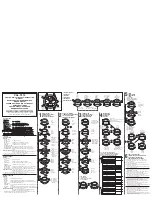
Operation Guide 5082
4
Reference
This section contains more detailed and technical information about watch operation.
It also contains important precautions and notes about the various features and
functions of this watch.
Auto Return Features
•
If you leave the watch with a flashing setting on the display for two or three minutes
without performing any operation, the watch will exit the setting mode automatically.
•
The watch will return to the Timekeeping Mode automatically if you do not perform
any operation for two or three minutes in the Alarm Mode.
High-Speed Movement
•
The
D
and
B
buttons are used to change setting in various setting modes. In most
cases, holding down these buttons will start high-speed movement.
Initial Screens
When you enter the Stopwatch Mode, World Time Mode or Alarm Mode, the data you
were viewing when you last exited the mode will appear first.
Timekeeping
•
Resetting the seconds to
00
while the current count is in the range of 30 to 59
causes the minutes to be increased by 1. In the range of 00 to 29, the seconds are
reset to
00
without changing the minutes.
•
The year can be set in the range of 2000 to 2099.
•
The watch’s built-in full automatic calendar makes allowances for different month
lengths and leap years. Once you set the date, there should be no reason to change
it except when battery has replaced.
•
The current time for all city codes in the Timekeeping Mode and World Time Mode is
calculated in accordance with the Coordinated Universal Time (UTC) for each city,
based on your Home City time setting.
Illumination Precautions
•
Illumination may be difficult to see when viewed under direct sunlight.
•
Illumination turns off automatically whenever an alarm sounds.
•
Illumination turns off automatically depends on the current illumination duration
setting.
•
Frequent use of illumination runs down the battery.
Specifications
Accuracy at normal temperature:
±
30 seconds a month
Digital Timekeeping:
Hour, minutes, seconds, p.m. (P), month, day, day of the week
Time format: 12-hour and 24-hour
Calendar system: Full Auto-calendar pre-programmed from the year 2000 to 2099
Other: Home City code (can be assigned one of 48 city codes); Standard Time /
Daylight Saving Time (summer time)
Analog Timekeeping:
Hour, minutes (hand moves every 20 seconds)
Stopwatch:
Measuring unit: 1/1000 second
Measuring capacity: 99:59'59.999"
Measuring modes: Elapsed time, Lap time, Split time
Other: Speed
Countdown Timer:
Measuring unit: 1 second
Input range: 1 minute to 24 hours (1-minute increments)
Other: Auto-repeat timing
World Time:
48 cities (29 time zones)
Other: Daylight Saving Time/Standard Time, Home City/World Time City Swapping
Alarms:
Four daily alarms, one snooze alarm, Hourly Time Signal
Illumination:
LED (light-emitting diode), Selectable illumination duration
Battery :
One lithium battery (Type: CR1220)
Approximate Battery Life: 2 years on type CR1220
(ten seconds of alarm operation per day, one illumination operation (1.5 seconds)
per day)
Pago Pago
Honolulu
Anchorage
Vancouver
Los Angeles
Edmonton
Denver
Mexico City
Chicago
Miami
Toronto
New York
Santiago
Halifax
St. Johns
Rio De Janeiro
Praia
Lisbon
London
Madrid
Paris
Rome
Berlin
Stockholm
PPG
HNL
ANC
YVR
LAX
YEA
DEN
MEX
CHI
MIA
YTO
NYC
SCL
YHZ
YYT
RIO
RAI
UTC
LIS
LON
MAD
PAR
ROM
BER
STO
City
City
UTC Offset/
Code
GMT Differential
City Code Table
–11
–10
–9
–8
–7
–6
–5
–4
–3.5
–3
–1
0
+1
City
City
UTC Offset/
Code
GMT Differential
Athens
Cairo
Jerusalem
Moscow
Jeddah
Tehran
Dubai
Kabul
Karachi
Delhi
Dhaka
Yangon
Bangkok
Singapore
Hong Kong
Beijing
Taipei
Seoul
Tokyo
Adelaide
Guam
Sydney
Noumea
Wellington
+2
+3
+3.5
+4
+4.5
+5
+5.5
+6
+6.5
+7
+8
+9
+9.5
+10
+11
+12
ATH
CAI
JRS
MOW
JED
THR
DXB
KBL
KHI
DEL
DAC
RGN
BKK
SIN
HKG
BJS
TPE
SEL
TYO
ADL
GUM
SYD
NOU
WLG
•
Based on data as of December 2008.
•
The rules governing global times (UTC offset and GMT differential) and summer
time are determined by each individual country.






















